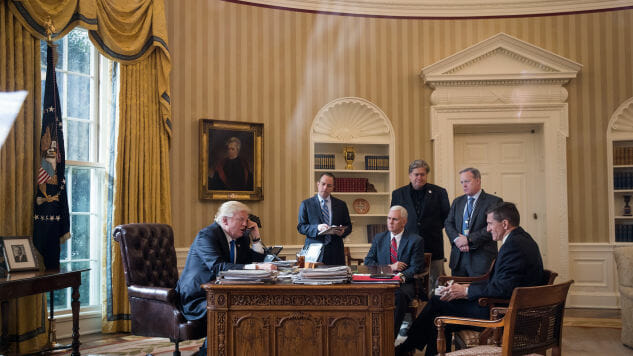Trump’s Team Is Amazingly Incompetent
How the White House does--and doesn't--rule
Drew Angerer / Getty
Courtiers—royal advisors—were often eunuchs. It kept them loyal. In monarchies, family is everything. Well, almost everything. Courtiers could still amass power for themselves and their ruler in the behind-the-scenes-maneuvering reserved for the arena of the “inner court,” as opposed to the public pageantry of the “outer court.” As John Ralston Saul points out in his history Voltaire’s Bastards, despite our pretensions, courtiers have not disappeared. The major difference is that now they no longer have to pick between public service and private power.
Like presidents before him, Trump brought his own court. They are incompetent, factional, and undeserving even by the most generous metrics of class entitlement. His cabinet is the wealthiest in American history. Many of them have been pulled from upper tier of the business class. Many of them hope to graft their business knowledge onto the running of the state—Trump ran on this old idea. Many of them—as a consequence of their backgrounds—have not been initiated in the workings of power and the dynamics of the inner court. This has given them little pause. Qualification is beside the point.
Earlier, our courtiers were prized for their competence, their specialization. Kissinger and McNamara were Saul’s sterling American examples. We could add Rumsfeld and others to the list. They were effective, qualified managers. And they succeeded in accruing power for themselves and the executives they served. Even if their presuppositions, once borne out, undermined fundamental aspects of the system, the system still functioned well enough. This also made them monsters. Of course, such a trajectory can continue only for so long. We have now arrived at the culminating state of decay.
The decay can be recognized in the dissolution between inner and outer court, the echo of the collapse of private palace power and public service. Inner court is where all the dirty laundry is kept—Nixon’s Watergate plot, for example, until it was exposed. Or Iran Contra. Or the justifications for Operation Iraqi Freedom. Discipline is required to enforce secrecy. Discipline doesn’t express itself only in individual resolve, but also in fear of punishment for breaches of code—as ever, hangmen and jailers decide the dimensions of the political. Obama understood this. He oversaw the most aggressive anti-whistleblower regime in American history. The inner court does not belong to daylight by design.
But the Trump administration has proven incapable of keeping secrets. The leaked rumors that his staff struggled to find the light switches in the West Wing. Or the rumors that Steve Bannon had called Senator Paul Ryan a “limp dick motherfucker born in a petri dish at the Heritage Foundation,” or Trump himself copping to a covert CIA program in Syria on Twitter, are all prime examples. These should be kept quiet if you want to maintain and wield power. It’s fine if they happen, but it’s another thing if everyone knows about it.
The administration is aware of the problem. Former communications director Anthony Scaramucci infamously told Ryan Lizza of The New Yorker, “What I want to do is I want to fucking kill all the leakers and I want to get the President’s agenda on track so we can succeed for the American people.” Despite Scaramucci’s hardline commitment to solving the loose-lips problem, Sean Spicer stepped down in protest of Scaramucci’s appointment. A strange moment to take a principled stand.
Perhaps he resigned because Scaramucci referred to Spicer as “Melissa McCarthy” when talking to other White House staffers, one of whom is likely the junior staffer from whom Spicer stole a mini-fridge in the first month of his brief tenure.
The rupture of the border between inner and outer court is best recognized in Scaramucci’s infamous tweet that, in the interest of transparency, he announced that he would be deleting old tweets. An incredible misapprehension of transparency and secrecy at once. Many of the tweets revealed Scaramucci holds views opposed to many of Trump’s professed positions to the extent that Donald Trump holds any positions at all.
This is amusing, but not shocking. No administration has been monolithic in its members’ beliefs. And when power is on offer, most people’s beliefs prove flexible, anyway. What’s striking is that Scaramucci announced what he was going to do. Rumsfeld, the Mephistopheles of perception management, would never make such an error. He understood how much power depended on the right behavior in public and in private. But Rumsfeld came up during the Nixon Administration. He’d been in government nearly forty years before he became Bush’s Secretary of Defense (his second time in the position). He was a seasoned technocrat in the spring of his powers when the Twin Towers fell.
Still, Rumsfeld’s acumen belies that the collapsed border between inner and outer court is symptomatic of a larger problem: The Trump administration has no idea how to govern (a fact that does not inhibit them from terrorizing the Middle East, among other things, which should tell us something about our government). That Trump drafted his cabinet from the business class was no accident. Steve Bannon said as much at CPAC earlier this year. The idea was that these scions of capital could use their corporate managerialism scale back their departments’ powers. The goal is to end the “administrative state” erected “by liberals.”
Betsy Devos’ installation in the Department of Education demonstrates what Bannon, and so Trump’s, vision might look like in action. DeVos is a proponent of private charter schools. She was likely brought in to lay low the public education system as we know it. Her execution of this project has been baffling because she has no idea how to do her job. Take higher education. According to the Chronicle of Higher Education, DeVos “has left experts on both the right and the left searching for a coherent message on how the federal government intends to tackle broader challenges in the higher ed sector.” There is no plan, in other words. This comes nearly a half a year into her tenure.
But what she has done is make it harder for colleges to be disciplined for harming students, and reduced her department’s role and responsibility in the investigation of campus rapes (“narrowed the scope of the department’s investigations” is how The Chronicle spins it). The Secretary of Education does not seem to believe students are the most (or maybe even an) integral part of the education system. The Trump administration’s disdain for the administrative state manifests in the immiseration of the public.
Whether Bannon hoped to destroy the administrative state through incompetence or neglect is unclear and irrelevant—the effect is the same. Despite this, Bannon has also made what he calls “economic nationalism” a major part of Trump’s alleged agenda. Who knows what this means? Likely it involves having a “hard state” to enforce borders, plus a ramp-up in tariffs, but without an expansion of the welfare state. The idea’s most recent expression is Bannon’s plan to press for a 44% marginal tax rate on those who make upwards of $5 million a year—this is almost a 5% increase. What for? Usually, this kind of push is aimed at accruing funds to supply the public sector with much needed cash-flow. But such an objective would be decidedly “administrative.” Even increasing taxes speaks to administrative desire regardless of its object.
The incoherence is glaring. They want populism without having to give anything to the public; they want to end the administrative state but do not want to provide the people with broader democratic access to power; they want establishment power, but not on establishment terms. So, what do they actually want? In the past, confusion and ambivalence have been managed or elided through strategy and optics. Trump and his courtiers have mastery of neither strategy nor optics.
This is why it’s worth repeating that the conservative movement has, for now, won the battle for dominion over America. They have monopoly power at the state and federal levels. This is their long-desired victory. In the vulgar parlance of the alt-right, they have accrued enough power so as to be “uncucked” by the normal ventilations of political monopoly our checks and balances ought to provide. But the administration hasn’t been as successful as their grip on power would suggest.
Trump hasn’t been able to deliver on his campaign promises, the most recent failing being the attempts at repealing and replacing Obamacare (not to say the fight has ceased). Though these failings haven’t kept the administration from emphasizing and empowering already cruel parts of the state, it is telling that Trump’s most successful agent is Jeff Sessions, the traditional politician. He’s done well in mustering state power to brutalize immigrants. This is because Sessions knows how the game works and because of that he’s effective. More effective than the rest of the “elites” in the administration.
Their general lack of effectiveness does not bode well for another reason: the elites of American society have ceased governing out of a practical class self-interest. The 2016 election was a demonstration of this decline. But it is also clear in the tensions and upheavals in Trump’s administration—Scaramucci was fired after a glorious few days. Priebus went with him. The State Department’s so understaffed as to be non-operational. The list goes on. Taken together, this is the picture of a crumbling empire.
As tired as America-Rome comparisons are, I at least want to bring up the Roman idea of civitas, the contract that binds the citizens together, the idea that the state has to provide working roads, drinkable water, the semblance of integrity in its justice system, etc. If you can’t placate the people with at least a mildly fair social contract, they won’t stand for it. And right now in America, whatever contract the people have with their government is unclear at best and negligible at worst. This at a time of economic disparity. A time when gerrymandering and PACs have trivialized the voting. And, as always, a time of racial injustice.
Revolutions don’t happen just because the people rise up against the ruling class. Plenty of uprisings have been crushed by an effective and unified monarchy, aristocracy, or oligarchy. Revolution also depends on the radical decay in the ruling elite. The decay can no longer be ignored. And there is no going back. This is the water in which we now swim. Both parties are in chaos. The GOP is a rogues’ gallery of nightmare people. And Trump’s comments on the neo-Nazi terrorist attack in Charlottesville further unmasked the xenophobic cruelty at the heart of his administration. This can only foment disorder which will motivate violent crackdowns.
And the Democrats are in their dotage. They can’t figure out how to regain power despite the task’s obviousness. They need to establish themselves as a clear alternative. But now pro-choice is no longer a litmus test for campaign funding—strategically stupid, ethically bankrupt. Plus, they don’t want single-payer healthcare despite its public support. To resolve this, all they would have to do is lie about their intentions, an historically effective tool of power. And when elites can’t lie and lie effectively, when they can’t do the one thing that has reliably secured their power, then the game’s up. If things escalate, the elites won’t be pouring over tarot cards like the Romanovs were one hundred years ago—they’ll be scrolling through spreadsheets in the dark wondering where it all went wrong.







































